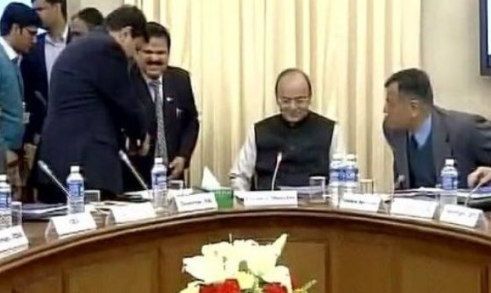The 16th edition of the Financial Stability and Development Council (FSDC) meeting was held on January 5, 2017 in New Delhi under the Chairmanship of the Union Finance Minister Arun Jaitley.
Aim: The FSDC meeting was held to discuss about the obstacles faced by the economy and to bring out the solution to tackle them. Besides, it also aimed at bringing new suggestions and outcomes in order to benefit the upcoming Budget 2017-18.
The important dignitaries present during the meeting included RBI Governor Urjit Patel along with Finance Secretary Ashok Lavasa, Economic Affairs Secretary Shaktikanta Das, Financial Services Secretary Anjuly Chib Duggal, Revenue Secretary Hasmukh Adhia, Disinvestment Secretary Neeraj Kumar Gupta, SEBI Chairman U K Sinha, IRDAI Chairman T S Vijayan and PFRDA Chairman Hemant G Contractor.
Key Discussions Held During the Meeting
i.While chairing the meeting, the Union Finance Minister, Arun Jaitley emphasized the significance of demonetization decision saying that the government’s measures to eliminate the shadow economy and tax evasion are expected to have a positive impact both on GDP and on fiscal consolidation in the long run.
ii.The Council, which has heads of all financial sector regulators as its members, reviewed the major issues and challenges facing the economy and noted that India appears to be much better, placed today on the back of improvement in its macroeconomic fundamentals.
iii.Financial regulators gave suggestions to promote financial stability and also discussed the measures and initiatives to establish and promote the financial stability. Also, the regulators offered their suggestions for the upcoming Budget for 2017-18, which were discussed by the Council.
iv.In the meeting, Chief Economic Advisor Arvind Subramanian made a presentation on the state of the economy.
v.FSDC discussed about the various initiatives taken by the government and regulators for promoting financial inclusion/ financial literacy efforts and discussed further measures for promoting the same.
vi.A brief report on the activities undertaken by the FSDC sub-committee, chaired by RBI Governor Urjit Patel, was placed before the FSDC. The Council also undertook a comprehensive review of the action taken by members on the decisions taken in earlier meetings of the Council.
vii.Key issues relating to the increase in non-performing assets (NPAs) in banks were also discussed by the Council. It reviewed the status of NPAs of public sector banks and the measures taken by the government and the RBI for tackling the stressed assets and discussed about further action to be taken in this regard
viii.The Council also discussed issues relating to Fintech, digital innovations and cyber security. The Council took note of the initiatives taken in this regard by the government and the regulators and discussed on further steps to be taken.
About Financial Stability and Development Council (FSDC)
i.Financial Stability and Development Council is an apex-level body constituted by the Government of India.
ii.The idea to create such a super regulatory body was first introduced by the Raghuram Rajan Committee in 2008. Finally in 2010, the then Finance Minister of India, Pranab Mukherjee, decided to set up such an autonomous body dealing with macro prudential and financial regularities in the entire financial sector of India.
iii.The new body envisages to strengthen and institutionalize the mechanism of maintaining financial stability, financial sector development, inter-regulatory coordination along with monitoring macro-prudential regulation of economy.
Roles & Responsibilities of the Council
Financial Stability, Financial Sector Development, Inter-Regulatory Coordination, Financial Literacy, Financial Inclusion, Macro prudential supervision of the economy including the functioning of large financial conglomerates
Coordinating India’s international interface with financial sector bodies like the Financial Action Task Force (FATF), Financial Stability Board (FSB) and any such body as may be decided by the Finance Minister from time to time.




